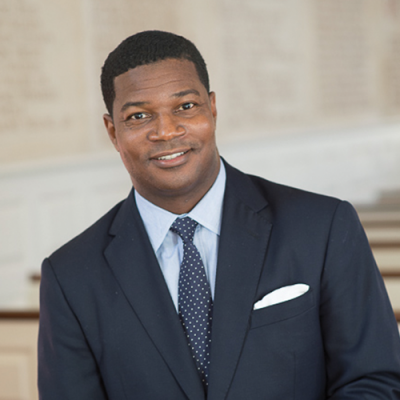By Jonathan L. Walton
 Higher education is being transformed. Technological innovation has both expanded and displaced traditional notions of the classroom, as online instruction and Web-enhanced teaching spaces are becoming the norm. Collaborative learning environments along with multimedia teaching and assignments will continue to grow and to promote intellectual cross-pollination.There are many reasons to welcome this educational revolution. Increasing the opportunities for experiential learning and dismantling boundaries once created by disciplines and physical distance are cause for excitement. As President Faust likes to say, “Harvard is about possibilities.”
Higher education is being transformed. Technological innovation has both expanded and displaced traditional notions of the classroom, as online instruction and Web-enhanced teaching spaces are becoming the norm. Collaborative learning environments along with multimedia teaching and assignments will continue to grow and to promote intellectual cross-pollination.There are many reasons to welcome this educational revolution. Increasing the opportunities for experiential learning and dismantling boundaries once created by disciplines and physical distance are cause for excitement. As President Faust likes to say, “Harvard is about possibilities.”
Nevertheless, technological innovation demands ethical reconsiderations. From Johannes Gutenberg to Bill Gates, radical shifts in the production and dissemination of knowledge always impact how communities view the distribution of resources, access to services, and social obligations. For instance, federal cuts to research funding reveals a culture that increasingly views higher education as a private rather than a public good. An increased emphasis on learning outcomes and “practical competencies” can threaten curricular options that cultivate imaginative, artistic responses to fundamental human questions regarding the right, the good, and the just. We must also remain cognizant of the ways advanced technologies can both foster and disrupt human community. Computer avatars and online profiles should never replace face-to-face encounters, nor should we uncritically embrace an all-encompassing e-networked world.
These are just a few of the reasons why the Memorial Church of Harvard University matters. During times of rapid change, we all need an axis mundi, a place of centering and connection to that which is sacred. This is particularly true for our students. There is comfort in examining new ideas, engaging a wide variety of cultures, and accepting unique challenges when students feel they are a part of a community in which intergenerational rituals are practiced and familiar stories are told. For this reason the ordinances of Baptism and Holy Communion are offered at least once per month at the Memorial Church. Also, alongside our commitment to multifaith dialogue and critical approaches to the study of religion, we continue to share a consistent, two-thousand-year-old message about God’s abiding love and amazing grace as evidenced in the form of a Palestinian Jewish woodworker, Jesus of Nazareth.
This community seeks to be a space of grace at the center of Harvard Yard; the Memorial Church is a central site of human connection. Local retirees, visiting alums, and members of HUCTW (Harvard University Clerical and Technical Workers) start their day shoulder to shoulder with students at Morning Prayers. Thousands download the beautiful music of Gund University Choirmaster Edward Jones and the University Choir from as far away as Johannesburg and London. And our Sunday morning worship service continues to attract students, staff, faculty, and community members from across the Greater Boston area. Such connections bring me joy!
In addition, the Memorial Church expanded our offerings this year to further our reach into the community. Some of you know that teaching is my passion, which is why I instituted a monthly Bible Study this year entitled Reading the Bible in Its World for Your World. Not only did this allow me to engage with members of the larger community in an intimate classroom setting, but new friendships and prayer-partners developed among many of you. What is more, Christian athletes and students from more expressive, evangelical backgrounds pack into the Pusey Room every Wednesday night to lift holy hands in worship with Harvard Cru chaplains Pat and Tammy McLeod. This vital and vibrant ministry reflects our commitment to religious diversity among fellow Christians on this campus. Whether singing anthems in Latin or praise songs accompanied by an acoustic guitar, we will never allow a particular style of worship to exclude students’ access to the Memorial Church. This is what it means for us to be a space of grace!
In short, I am thrilled to reflect on what the Memorial Church has accomplished this year. The future looks bright. The Reverend Doctor Lucy Forster-Smith, Sedgwick Chaplain to the University, brings nearly three decades of experience in multifaith chaplaincy at the college and university level to Harvard. Ministry Fellow Alanna Copenhaver’s inexhaustible work ethic and her contagious, positive personality continue to catalyze student involvement from across this University. And our growing team of seminarians helps to provide renewed moral focus and clarity of purpose to the Memorial Church through daily worship, working with the Grants Committee, and offering ongoing student support groups.
For all of these reasons and more, there is no reason for us to fear the larger transformations underway at Harvard University. We stand between VERITAS (truth) and CARITAS (love) at the Memorial Church, and there is no fear in love, as love casts out all fear (I John 4:18). Continue to stand with us! We need one another. For the love of God and the love of humanity are…
Jonathan L. Walton is the Plummer Professor of Christian Morals and Pusey Minister in the Memorial Church and Professor of Religion and Society at Harvard Divinity School.
